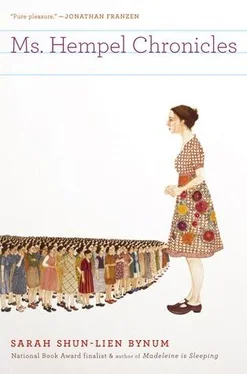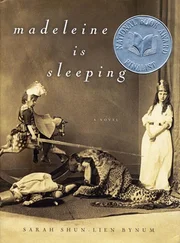A volunteer hoisted himself up onto the stage. He was a father, but one whom Ms. Hempel didn’t recognize. Tall and homely, he stooped down, as if longing to be the same compact size as Harriet Reznik, but she shot him a forbidding look and fanned the cards brusquely in his face. “Pick a card, any card,” she commanded. The father danced his hand over the splayed cards Harriet held before him. “Do not, at any cost, show me the card you have chosen,” she said. He extracted a card from the fan and held it to his chest. “Study your card. Memorize it.” He did as she told him. “Once you are absolutely sure you have memorized the card, you may show it to the audience.” The father shielded his eyes and slowly rotated his outstretched arm from one side of the auditorium to the other, displaying his selection. Parents, kids, teachers, all leaned forward at once. A six of spades. Ms. Hempel heard a little boy somewhere behind her whisper it to himself. “You may replace the card,” Harriet Reznik said. Frowning deeply, she shuffled the deck, cut it, stirred the cards around on her little card table. Then, abruptly, she swept them into a pile and rapped them against the heel of her palm. After placing the deck in the center of her table, she waited, face straining; she seemed to count silently to ten. The magic book’s instructions must have included, Ms. Hempel realized, this moment of suspense. Now Harriet Reznik was ready to continue. “Is this,” she asked, delicately tweezing a card off the top of the pile, “your card?” With an uncharacteristic flourish, she snapped back her cape. The audience gasped. The father’s mouth opened and closed.
It was not his card. The card that Harriet Reznik held before her was not the six of spades; it was the eight of diamonds.
The father paused. Lie! Just lie! Ms. Hempel willed him to do it: Lying won’t kill you. But then, with terrible reluctance, he shook his head. Harriet Reznik looked stunned; she flipped over the card, stared at it; she peered closely at the father: “Are you sure?” She asked it very politely. Ms. Hempel, sitting on her plastic chair, wanted to be someplace far away, and to take Harriet Reznik, cape trailing, along with her. She folded her program into smaller and smaller squares. The father looked searchingly into the wings, as if hoping some benevolent figure offstage might come out and rescue him. Harriet, with painful concentration, returned the wrong card to the top of the pile. “You can sit down now,” she said.
The father walked out to the edge of the stage and bent down so that he could ease himself off. He seemed anxious to return to his seat, to the child waiting for him there. “Hold on!” Harriet Reznik shouted. The audience sat up; the man stopped, mid-crouch. “Wait!” she cried. “What’s sticking out of your back pocket?” The father straightened, bewildered, and turned to face her. As he did so, Ms. Hempel saw that Harriet was right: there was something square, and stiff, protruding from his rear pocket. “Is that one of my cards?” Harriet asked. It was. The six of spades.
The entire auditorium shuddered. “Oh god!” the little boy said, involuntarily. “Oh god! Oh god!” The applause was thunderous. Parents clutched at each other and hollered, utterly without embarrassment. Kids cupped their hands over their mouths and sounded long, keening cries. Up onstage, standing behind her card table, Harriet Reznik gleamed. “Just wait till you see the next one!” she shouted over the noise.
Suddenly there was a wild rustling. From beneath her little table, from inside a cardboard box punctured with holes, Harriet Reznik coaxed a bird: not a dove, or some other mild-mannered sort, but a glossy and muscular crow. It cawed loudly. It flapped its enormous wings. It tipped over its box, struggled out of Harriet’s grip, and took flight. The audience inhaled, their heads craning as they followed its path around the auditorium, black wings beating the air. The crow swooped low; boys reached up to catch ahold of it; Mrs. Willoughby took shelter beneath her program; adults tucked the heads of small children under the crooks of their arms; Mr. Radovich barreled toward the emergency exit; Harriet Reznik stood onstage, mouth agape, marveling at what she had unleashed. Ms. Hempel watched it glide toward her — shiny feathers, hoarse call — and lifting up an arm, she stretched out her fingers: she touched it!
IT WASN’T EVEN HALLOWEEN YET, but Ms. Hempel was already thinking about her anecdotals. The word, with all its expectations of intimacy and specificity, bothered her: a noun in the guise of an adjective, an obfuscation of the fact that twice a year she had to produce eighty-two of these ineluctable things. Not reports, like those written by other teachers at other schools, but anecdotals: loving and detailed accounts of a student’s progress, enlivened by descriptions of the child offering a piercing insight or aiding a struggling classmate or challenging authority. It was a terrible responsibility: to render, in a recognizable way, something as ineffable as another human being, particularly a young one. On average she would spend an hour writing about each child, and then waste up to another hour rereading what she had just written, in the hope that her words might suddenly reveal themselves as judicious. But too often Ms. Hempel’s anecdotals reminded her of those blurry portraits from photography’s early days: is that a hand I see? A bird? The sitter has squirmed, readjusted her skirts, swatted at a fly: she is no longer a child, but a smudge of light. This is how Ms. Hempel’s students appeared, captured in her anecdotals: bright and beautiful and indistinct.
The cubicle where she now sat, peeling an orange, would, in less than two months, become a Faculty Work Station. Other faculty members would sit in the work stations next to hers; they would peer over and say, “Don’t kill yourself. You’re not writing a novel.” But now there was only Mr. Polidori, humming faintly and balancing equations.
The science and math teachers had it easy. During anecdotal season, Ms. Hempel would berate her younger, student self: she never should have turned away from the dark and gleaming surfaces of the lab. She had chosen instead the squishy embrace of the humanities, where nothing was quantifiable and absolute, and now she was paying for all those lovely, lazy years of sitting in circles and talking about novels. Mrs. Beasley, the head of the math department, had perfected an anecdotal formula: she entered the student’s test scores, indicated whether his ability to divide fractions was “strong,” “improving,” or “a matter of concern,” and then ended with either congratulations or exhortations, whichever seemed more appropriate. The formulaic would not do, however, for an English teacher. Ms. Hempel could not complain of a child’s limited vocabulary or plodding sentences without putting on a literary fireworks display of her own. Because there was always that skepticism: students who didn’t quite believe that she could do all the things that she required of them (vary your sentence structure — incorporate metaphors — analyze, not summarize!), as if she were a fleshy coach who relaxed on the bleachers while the team went panting around the gym.
So the anecdotals must be beautiful. But she didn’t want them to sound florid, or excessive. She didn’t want to sound insincere. (Oh, superlatives! Ms. Hempel’s undoing.) She wanted to offer up tiny, exact, tender portraits of the children she taught, like those miniature paintings that Victorians would keep inside their lockets along with a wisp of hair. And though she would fail to do so every time, she had not resigned herself to failure, could not experience that relief; every December and every May she would sit down to write, dogged by the fear that she would misrepresent a child, or that through some grievous grammatical error, some malapropism, some slip, she would expose herself, that she would by her own hand reveal the hoax.
Читать дальше












